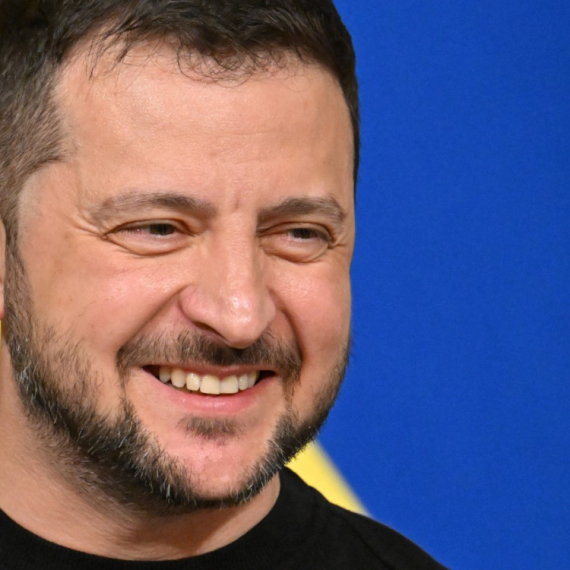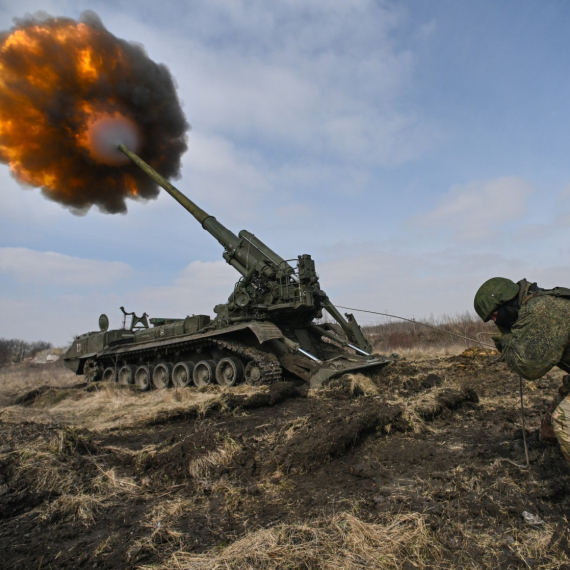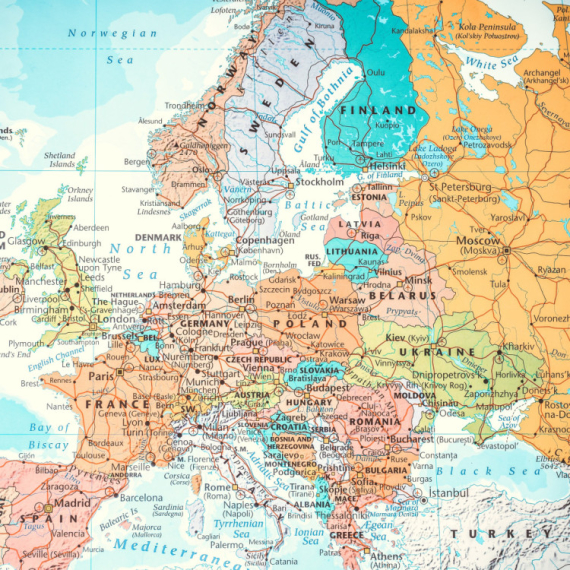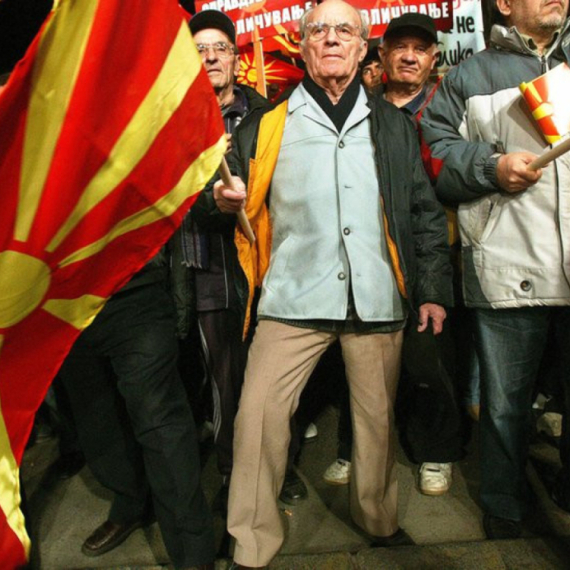Tadić: EU membership is strategic goal
President Boris Tadić says he has done everything in his power to make Serbia become the driving force of positive changes in the region.
Tuesday, 26.10.2010.
09:33

President Boris Tadic says he has done everything in his power to make Serbia become the driving force of positive changes in the region. Speaking on Tuesday at a conference on Southeast Europe in Stuttgart, Germany, he reiterated that the country's EU membership is a strategic goal of his policy. Tadic: EU membership is strategic goal As Serbia's president, I have done everything in my power to make my country become the driving force of positive changes in the region - in the interest of securing peace, stability and better life for the citizens, Tadic said at the conference on Southeast Europe, held in scope of the forum for international contacts and investment Global Connect 2010, which was staged in the capital of one of Germany's economically strongest provinces, Baden-Wurttemberg. Objectively speaking, Serbia is already the key country in the region of Southeast Europe, Tadic underscored. At the same time, he stressed that he never questioned Serbia's EU membership as being a strategic goal of his policy, which once realized, will also represent an important step for the European Union itself. He recalled that only a few years ago, the region of Southeast Europe was viewed as an area at the margins of the European and the world's mainstream, ridden with clashes and conflicts, divided into weak countries with feeble or non-existing economic perspectives. Over the past five years, Serbia has put a huge effort to change not only that image but also the reality in the region, so that our European perspective could become palpable, the Serbian president said. Commenting on the EU enlargement fatigue, Tadic said that he views that as only a temporary phase, as the EU, a complex mechanism of 27 members, needs some time to consolidate itself institutionally. Tadic also said he backs the visa liberalization towards Albania and Bosnia-Herzegovina which should come into force by the end of the year, and qualified the support as not just an act of good will, but also as a step forward in the direction of speedier European integration of the region as a whole. Referring to Serbia's efforts to resolve issues which are important not only for itself, but also for the entire region, Tadic reiterated that his country is committed to dialogue as a way of problem solving, and pointed out once again that Serbia will never acknowledge Kosovo's self-proclamation of independence. As a democratically elected president, I have never had any doubts as to whether democratic and peaceful means are the only way in which regional differences and historical conflicts should be resolved, Tadic underlined. In this sense, Serbia has recently submitted together with the EU a joint resolution to the UN which sets the framework for a dialogue on open issues between Belgrade and Pristina with EU participation, Tadic recalled. When it comes to cross-border cooperation, one of Serbia's main priorities is te fight against organized crime. In terms of economical and political goals, the priority is an uncompromising and systematical eradication of corruption, which is a prerequisite for the strengthening of the rule of law and encouraging new investments in the coming years, Tadic underlined. According to Tadic, the most significant result of economic cooperation in the region is the forming of the free trade zone CEFTA early in 2007. Serbia has already begun realizing the Corridor 10 investments worth EUR 2.5 billion, and the companies engaged in the works come not only from Serbia, but from the neighboring and other European countries as well, Serbian President Boris Tadic said. Boris Tadic (Tanjug, file) Serbia will fulfill obligations Serbian President Boris Tadic has stated that the current Serbian government is doing all it can to locate and arrest Ratko Mladic. In an interview for the International Herald Tribune (IHT), Tadic also drew attention to the fact that the task of arresting Mladic is not an easy one. "Ratko Mladic is not an ordinary fugitive, but an experienced soldier with considerable war experience," Tadic told the IHT. He added that information Serbia has obtained indicate that the individuals who were previously involved in shielding Mladic are former or retired soldiers themselves, and are also highly experienced. Most of them used to work in intelligence or security services and had been trained exceptionally well, which makes Serbia's task (of arresting Mladic) all the more difficult, Tadic said. The Serbian president noted that all efforts aimed at catching Mladic are being carried out in coordination with European partners. He expressed belief that Mladic will be successfully located and arrested in time. When asked what makes it so hard to find Mladic who has been hiding for 15 years now, and why he has not been extradited to the Hague, Tadic said that political will for Mladic extradition was not present at all times in the course of the past 15 years, and that Mladic did not even have to hide until 2000. The Serbian parliament adopted a law on cooperation with the Hague as late as in 2002, and it was only in 2008, when the current government was constituted, that political will and operative potentials for Mladic's arrest became the country's priority, the Serbian president stated. According to Tadic, the previous governments did not seem to attribute any special importance to this matter. Tadic said that Radovan Karadzic, another Hague indictee, was arrested soon after the constitution of the current Serbian government, which is a clear and unambiguous indicator of the country's commitment to arresting Mladic as well. The Serbian president expressed belief that the majority of Serbian citizens support the policy that all war criminals must receive a just punishment although, as he said, there are also those who deny the accounts of grueling crimes with which Mladic was charged and treat these facts as a conspiracy theory aimed against Serbia. "Serbia will fulfill its international obligations," Tadic asserted. "Even if the Hague stopped working, the government will continue searching for Mladic and use all available means to this end, because the state considers this task as its moral obligation to innocent victims and because it is the only way to reach reconciliation".
Tadić: EU membership is strategic goal
As Serbia's president, I have done everything in my power to make my country become the driving force of positive changes in the region - in the interest of securing peace, stability and better life for the citizens, Tadić said at the conference on Southeast Europe, held in scope of the forum for international contacts and investment Global Connect 2010, which was staged in the capital of one of Germany's economically strongest provinces, Baden-Wurttemberg.Objectively speaking, Serbia is already the key country in the region of Southeast Europe, Tadić underscored.
At the same time, he stressed that he never questioned Serbia's EU membership as being a strategic goal of his policy, which once realized, will also represent an important step for the European Union itself.
He recalled that only a few years ago, the region of Southeast Europe was viewed as an area at the margins of the European and the world's mainstream, ridden with clashes and conflicts, divided into weak countries with feeble or non-existing economic perspectives.
Over the past five years, Serbia has put a huge effort to change not only that image but also the reality in the region, so that our European perspective could become palpable, the Serbian president said.
Commenting on the EU enlargement fatigue, Tadić said that he views that as only a temporary phase, as the EU, a complex mechanism of 27 members, needs some time to consolidate itself institutionally.
Tadić also said he backs the visa liberalization towards Albania and Bosnia-Herzegovina which should come into force by the end of the year, and qualified the support as not just an act of good will, but also as a step forward in the direction of speedier European integration of the region as a whole.
Referring to Serbia's efforts to resolve issues which are important not only for itself, but also for the entire region, Tadić reiterated that his country is committed to dialogue as a way of problem solving, and pointed out once again that Serbia will never acknowledge Kosovo's self-proclamation of independence.
As a democratically elected president, I have never had any doubts as to whether democratic and peaceful means are the only way in which regional differences and historical conflicts should be resolved, Tadić underlined.
In this sense, Serbia has recently submitted together with the EU a joint resolution to the UN which sets the framework for a dialogue on open issues between Belgrade and Priština with EU participation, Tadić recalled.
When it comes to cross-border cooperation, one of Serbia's main priorities is te fight against organized crime. In terms of economical and political goals, the priority is an uncompromising and systematical eradication of corruption, which is a prerequisite for the strengthening of the rule of law and encouraging new investments in the coming years, Tadić underlined.
According to Tadić, the most significant result of economic cooperation in the region is the forming of the free trade zone CEFTA early in 2007.
Serbia has already begun realizing the Corridor 10 investments worth EUR 2.5 billion, and the companies engaged in the works come not only from Serbia, but from the neighboring and other European countries as well, Serbian President Boris Tadić said.
Serbia will fulfill obligations
Serbian President Boris Tadić has stated that the current Serbian government is doing all it can to locate and arrest Ratko Mladić.In an interview for the International Herald Tribune (IHT), Tadić also drew attention to the fact that the task of arresting Mladić is not an easy one.
"Ratko Mladić is not an ordinary fugitive, but an experienced soldier with considerable war experience," Tadić told the IHT.
He added that information Serbia has obtained indicate that the individuals who were previously involved in shielding Mladić are former or retired soldiers themselves, and are also highly experienced. Most of them used to work in intelligence or security services and had been trained exceptionally well, which makes Serbia's task (of arresting Mladić) all the more difficult, Tadić said.
The Serbian president noted that all efforts aimed at catching Mladić are being carried out in coordination with European partners.
He expressed belief that Mladić will be successfully located and arrested in time.
When asked what makes it so hard to find Mladić who has been hiding for 15 years now, and why he has not been extradited to the Hague, Tadić said that political will for Mladić extradition was not present at all times in the course of the past 15 years, and that Mladić did not even have to hide until 2000.
The Serbian parliament adopted a law on cooperation with the Hague as late as in 2002, and it was only in 2008, when the current government was constituted, that political will and operative potentials for Mladić's arrest became the country's priority, the Serbian president stated.
According to Tadić, the previous governments did not seem to attribute any special importance to this matter.
Tadić said that Radovan Karadžić, another Hague indictee, was arrested soon after the constitution of the current Serbian government, which is a clear and unambiguous indicator of the country's commitment to arresting Mladić as well.
The Serbian president expressed belief that the majority of Serbian citizens support the policy that all war criminals must receive a just punishment although, as he said, there are also those who deny the accounts of grueling crimes with which Mladić was charged and treat these facts as a conspiracy theory aimed against Serbia.
"Serbia will fulfill its international obligations," Tadić asserted.
"Even if the Hague stopped working, the government will continue searching for Mladić and use all available means to this end, because the state considers this task as its moral obligation to innocent victims and because it is the only way to reach reconciliation".

























































Komentari 12
Pogledaj komentare